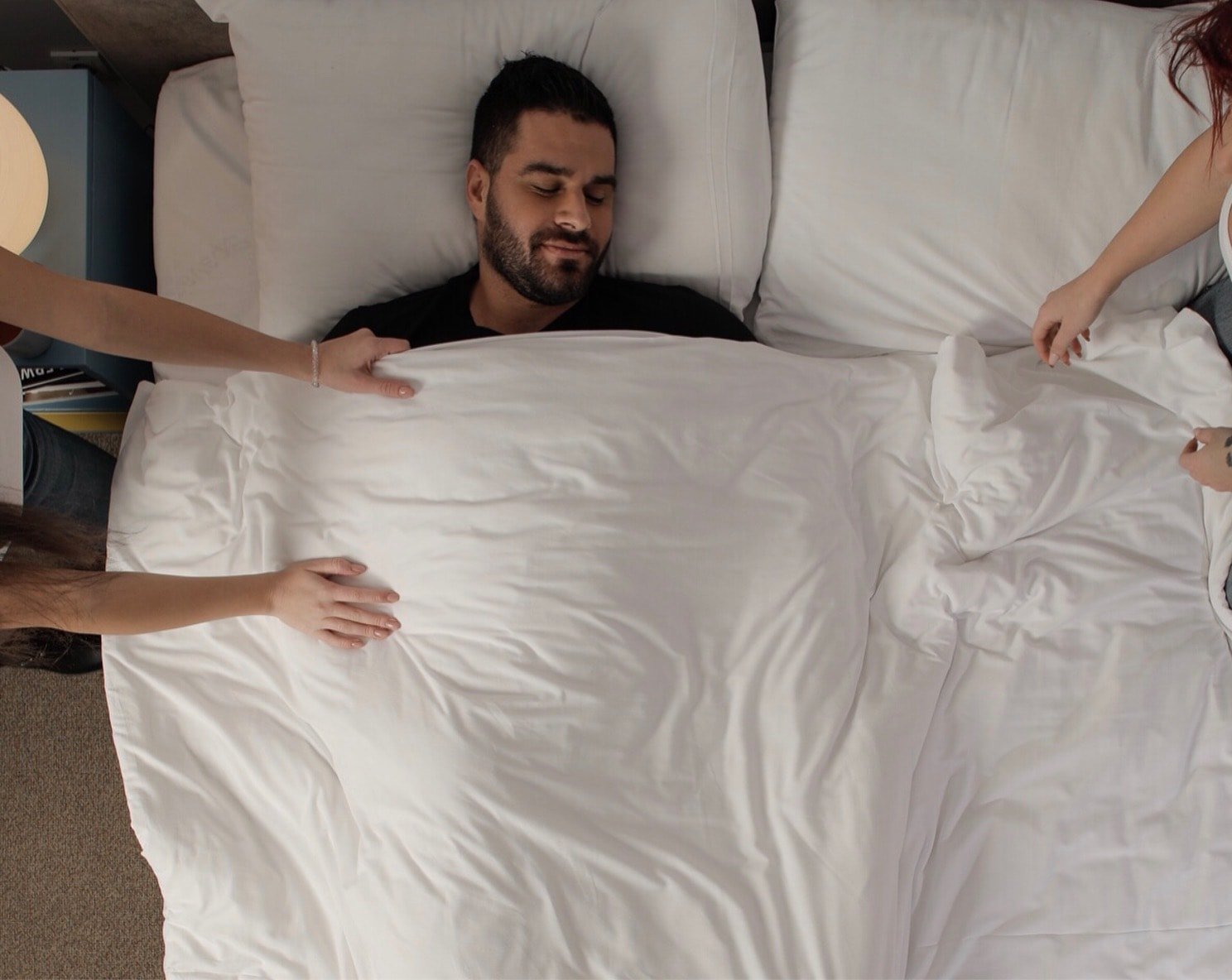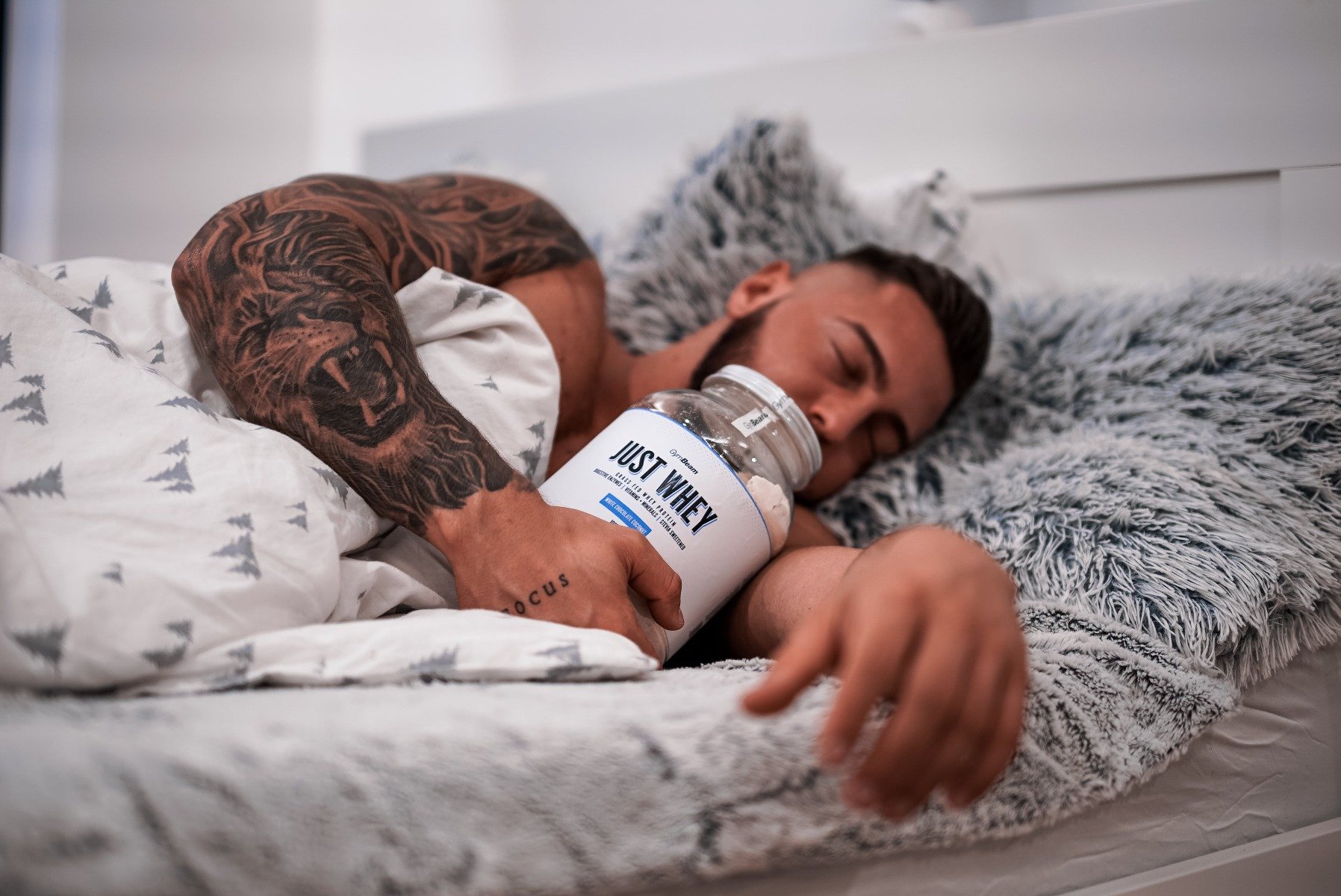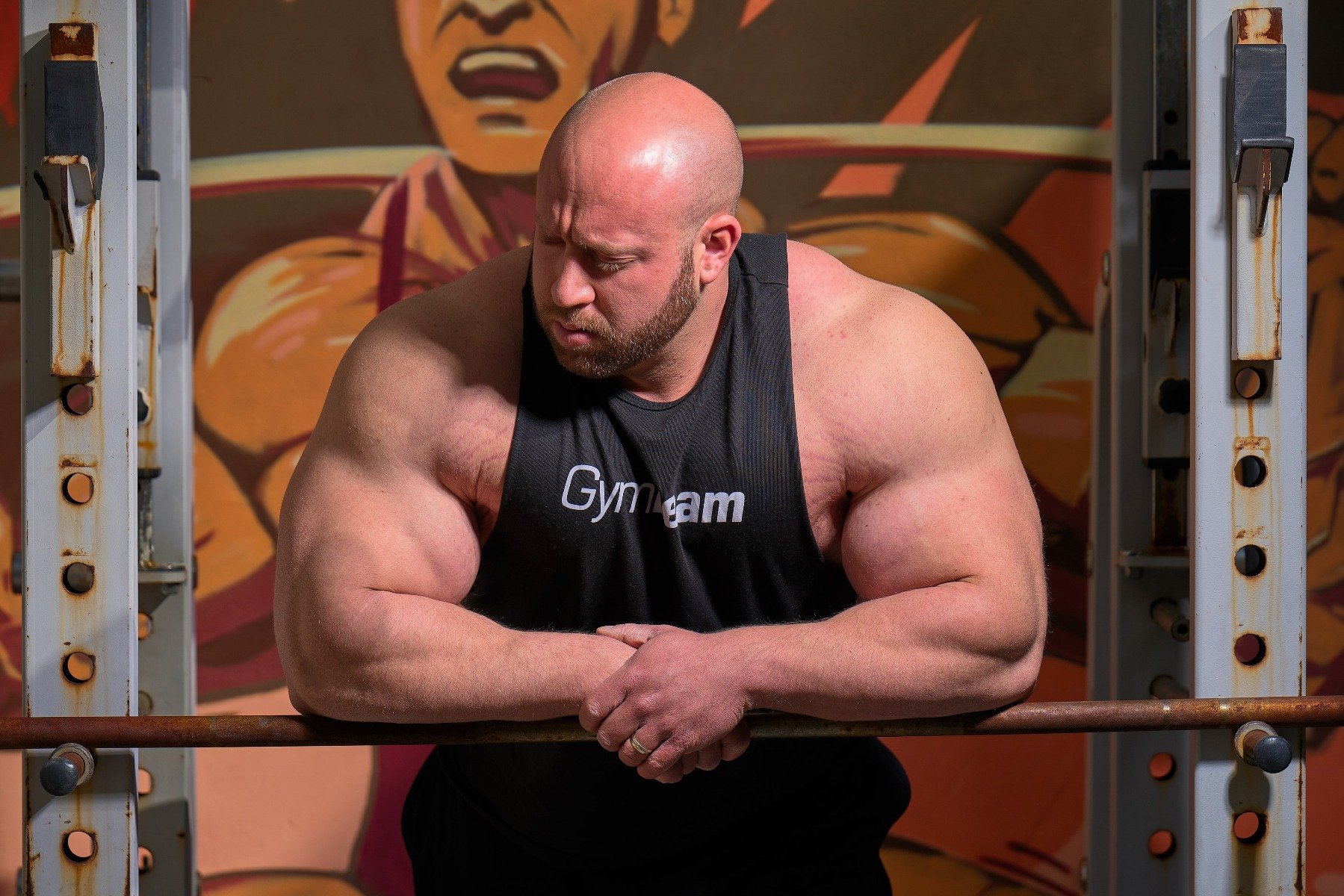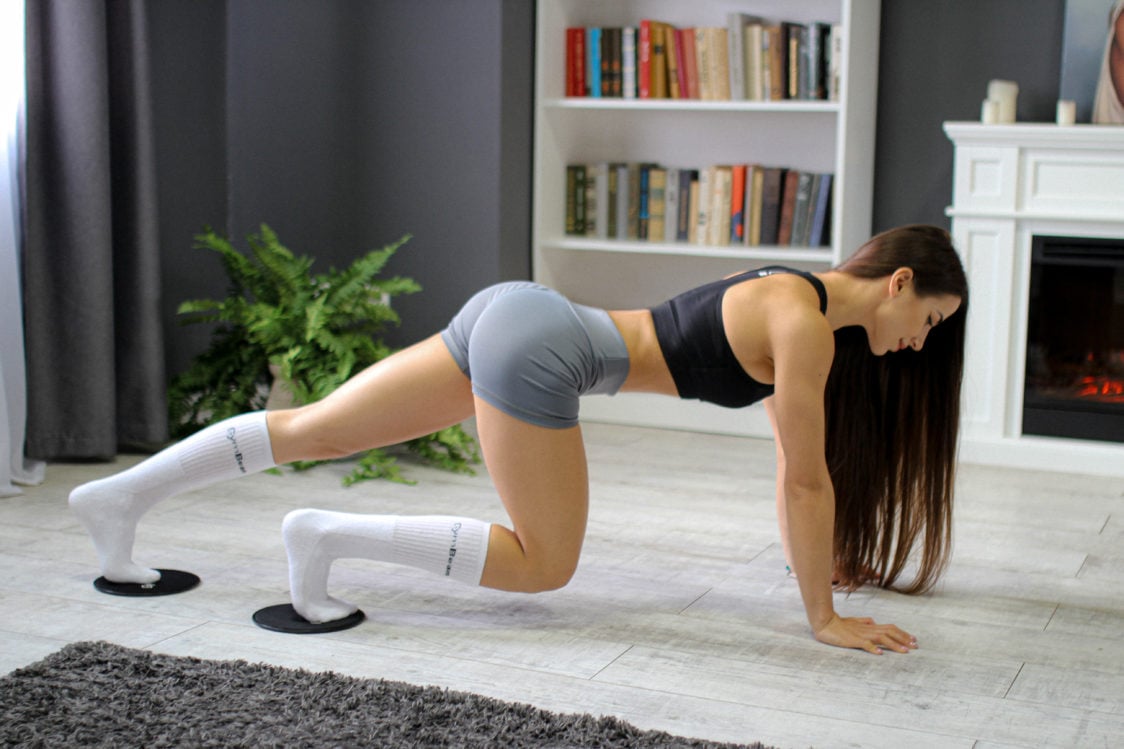Table of Contents
Sleep is a key part of our lives and without full sleep, the organism cannot recover sufficiently. It is especially important for athletes, because the training fatigues the body and muscles need time to renew themselves in addition to nutrients. Learn about the importance of sleep, its parts, but also the benefits to muscle and advices how to improve it.
Why do we sleep?
One needs to receive nutrients and fluids for his or her survival, but among the basic human needs belongs also sleep. We spend about a third of our lives in bed, and trying to avoid sleep would first lead you to a psychotic state and then end up in death. Randy Gardner, who is still alive by the way, holds the record in his long sleepless period. Randy managed to stay awake for 11 days and 24 minutes in 1965. In the last phase of the experiment he had fragmented thinking, his speech was unintelligible, and he couldn’t solve simple mathematical tasks for more than a few minutes. Sleep is very necessary for man for many reasons, and its lack leads to a reduction in vital functions and consequently death. However, an interesting fact remains that even after more than 60 years of sleep research, one question is still unanswered for scientists – Why do we sleep? [1] [2] [3]
Scientists know the processes that occur during sleep, as well as the benefits of quality sleep. The very reason why one gets into a strange state of hibernation in which he even dreams during his life is not yet known. To be accurate, not only humans, but all animals need sleep for their survival. In 1894, a Russian scientist discovered that the puppies die after a few days without sleep. Rats that die within three weeks in the absence of sleep are slightly better off. [2] [3]

What happens to us while we sleep?
Parts of sleep
The whole process of sleep is not just about closing your eyes, sleeping, and waking up again. During sleep, the human brain goes through cycles that have several phases and different things happen. One such cycle lasts approximately 90 minutes, and approximately 4-6 cycles are repeated over a 7 to 9-hour sleep period. [4] [5]
Three NREMs and one REM phase are alternated during one cycle. [5]
NREM (non rapid eye movement) – also known as non-REM, is a part of the sleep cycle before the REM phase. NREM is divided into 3 phases, which differ in depth. During the NREM phase, the eyes remain calm and the body can move. [6]
REM (rapid eye movement) – accounts for approximately 25% of total sleep, and is the deepest degree of sleep. The body is completely paralyzed during the REM phase and only eye movement occurs. This section transfers information from short-term to long-term memory. [6]
The NSF (National Sleep Foundation) classifies the sleep cycle into the following phases [4] [5]:
- N1 non-REM (formerly stage 1) – this is the shallowest part of the cycle, lasts approximately 7 minutes and accounts for about 2-5% of the sleep cycle, while N1 slows down pulse, eye movement and cardiac activity. It is considered a transitional period between drowsiness and wakefulness.
- N2 non-REM (formerly stage 2) – the phase between shallow and deep sleep, it is the longest part of the cycle, which makes up about 45 – 60%. There is a drop in temperature, muscle relaxation and pulse in the body.
- N3 non-REM (formerly stage 3 and 4) – also referred to as “delta sleep”. This is the beginning of a deep sleep, when the brain waves are further reduced, and at this stage the eyes and muscles do not move. This stage accounts for approximately 40% of sleep, during which cells, tissues and muscles are regenerated, as well as the body replenishes energy.
- REM – represents 20-25% of sleep, during which the brain activity, heart rate and also breathing speed up. The REM phase starts approximately 90 minutes after you fall asleep, the brain processes information while it is dreaming during the REM phase.

You might be interested in these products:
The importance of sleep for health
While you sleep, you rest and gain strength for the next day, but this is only a general starting point. There are many processes going on in the body that affect a person’s health. For all of these, we give you the most important health reasons why you should have a good night’s sleep.
1. Better sports performance
Regular exercise has a positive effect on sleep, but this also applies vice versa. We often notice the length and type of training, diet and other important attributes of our sports idols. Have you ever wondered how long the athletes sleep? According to the NSF (National Sleep Foundation), 7-9 hours of sleep is an ideal time for an adult, but it is important for athletes to sleep a little longer. Regardless of your passion for sports, having enough sleep will improve your sports performance in several areas. You will feel an increase in training intensity, speed, energy, coordination, and at the same time, sleep strengthens your mental functions. According to a study in SLEEP magazine, lack of sleep is associated with a decline in immediate decisions, while relaxed subjects showed an increase in accuracy. [7] [8] [9]
Certainly we do not want to encourage you to sleep longer, but this is just a short list of top athletes, who find adequate sleep very important.[10] [11] [12]
- LeBron James (12 hours)
- Roger Federer (11-12 hours)
- Lindsey Vonn (at least 10 hours)
- Usain Bolt (8-10 hours)
- Rafael Nadal (9 hours)
- Maria Sharapovova (8-9 hours)

2. Sugar levels are more under control
Glucose levels in the body are not only affected by diet choices and physical activity, but also by sleep. Glucose levels fall during a deep sleep faze, without enough sleep you basically do not allow your body to take a “break”. Without turning it “on and off”, it is harder for our body to respond to sugar levels and to our cells needs. Research form 1999 dealt with the effects of sleep deprivation on young men. Reducing sleep to 4 hours for 6 nights in a row, resulted in symptoms of prediabetes. However, the symptoms disappeared after a week of restored and extended sleep. Several studies point on the impact of sleep deprivation and the occurrence of type 2 diabetes. This means, that short sleep can not only lower your performance, but at the same time, lead to serious diseases.[13] [14] [15]
3. Change in total weight
Behind your weight gaining can be lack of exercise, choice of inappropriate food, but also poor sleep. According to scientific articles, it is because of the “deviated” levels of hormones in the brain. Chronic sleep deprivation causes higher levels of grelin (appetite-boosting hormone) and lower levels leptin (an appetite-suppressing hormone).[13] [14]

4. Emotional problems
For sure you are not surprised, that the absence of sleep is also related to emotions. A tired person is irritated and one that gets enough sleep is definitely not feeling bad.
But it’s not just about happiness, because sleep does not only destroy your emotional balance, but also affects the ability to evaluate the feelings of others. In the absence of sleep, one may have difficulty recognizing human expressions and emotions. Not only does physical performance decline, but also the ability to communicate in society.
Long-term sleep problems can result in emotional disturbances. It is scientifically proven that up to 90% of people with depression also have sleep problems. Much worse is the fact, that poor sleep is even associated with an increased risk of suicidal tendencies. Managing your daily responsibilities is challenging, but sleep will support not only the physical, but also the mental health.[7] [13] [14]
Effect of sleep on muscles
Sleep affects a whole series of systems in the human body, therefore processes that take place during sleep logically affect muscle mass. Proper training and nutrient intake are not enough for adequate results, the body needs to regenerate and process progress. The best way to relax is to sleep, both for muscle mass growth and performance improvement.[4] [16]
Sleep and growth homone
During sleep, energy consumption is reduced, brain cells are renewed, the body produces growth hormone, and if you indulge proteins before sleeping, their synthesis occurs. Growth hormone is one of the most important components that are present in muscle growth and recovery. You know the essence of protein synthesis, the body takes up proteins, cleaves them into amino acids, and then uses them to build tissues. However, you may not have known that the body needs growth hormone for this process. As it washes away during sleep, you are actually sabotaging your workouts and nutrient intake because of lack of time in bed. Of course, growth hormone is also excreted during training, but up to 75% is excreted during sleep. The main time at which growth hormone is excreted, is the first part of phase 3 of the sleep cycle. The organism is in deep sleep during this period, tissues and, of course, muscles are repaired.[4] [16] [17]
Do you want to further promote the excretion of growth hormone? It can be “helped” if you consume a combination of protein and carbohydrates 30 minutes before and after weight training. If you know this “trick” or are about to try it, let us know about the improvement, that it caused.[16]

Sleep and testosterone
To provide your body with enough sleep in addition to all your responsibilities is not easy, but very important,. This is especially true, if you care about muscle maintenance and growth. Testosterone is another reason besides growth hormone. Indeed, lack of sleep has the effect of reducing testosterone levels. Study in year 2015 looked at changes in testosterone levels in young men, when their sleep time was reduced. The participants slept only 5 hours a day for 1 week. This reduction resulted in a loss of 10 to 15% testosterone. As you can see, even a short period of sleep depression has a significant impact on hormonal balance. Testosterone is an important hormone, that affects not only muscle growth but also fat burning. It is a pity to reduce testosterone by inadequate sleep, because we naturally lose it during life. Aging is naturally associated with the loss of testosterone, approximately 1 to 2% per year.[18] [19]

Would you like to learn more about the effects of low testosterone? Get all the necessary information in our article – Symptoms of low testosterone levels and how to fight it.
How to make quallity of sleep better?
To have a better and longer sleep is certainly a wish of many of us, but it’s not that easy. In the evening we bring our problems, worries and stress from the whole day to our bed. Perhaps, you also evaluate new perceptions and information in the last moments before sleep. Identify factors, that affect your sleep quality both positively and negatively [4] [20]:
1. Caffeine – morning coffee obviously does not affect evening sleep, but caffeine intake in later parts of the day can be a problem. Caffeine is a well-known and consumed stimulant, that improves attention, promotes alertness and stimulates the nerv system. It remains in the blood for about 6-8 hours, so drinking coffee 6 hours before sleep can affect sleep quality.
2. Exercise – training during the day can tire the body and improve sleeping. Aerobic exercise in particular are a proof, but training in the late evening can have the exact opposite effect.
3. Alcohol – drinking alcohol seems to be a good solution for falling asleep, but it has the exact opposite effect. It affects melatonin and growth hormone levels, causes snoring or sleep apnea. Alcohol interferes with the levels of sleep, thereby disturbes our sleep. Having a glass of wine in the evening may not be a problem, but if you have “guzzle” several drinks in the evening, don’t be surprised to wake up during the night.
4. Watching TV in bed – someone’s watching TV in the evening may help them with falling asleep, but it may also keep their attention. Watching TV in bed gives the brain an incentive to keep attention, instead of getting ready for sleep. Another problem may be its luminosity, so it is advisable to turn off the TV and all the bright lights at least 2 hours before going to bed.
5. Sleeping environment – the bed itself and its surroundings also contribute to the success of falling asleep. Bed, pillows and mattress affect the position of the body, joints, spine and other aspects, that can cause sleep problems. It is recommended to change the mattress and bed equipment approximately every 5 – 8 years.

Nutritional supplements for better sleep
Various nutritional supplements can also be used to calm the body and induce sleep. Don’t worry, today there exist natural-based supplements and ones that don’t cause addiction. However, it is always necessary to read the package leaflet and get to know their dosage before starting to use it. Nowadays, there are a wide range of supporting supplements, we bring you the best known and most popular [20] [21] [22] [23] [24]:
- Herbal supplements -among the plants that support sleep belong lavender and ginkgo biloba which have a relaxing effect on your body, making you sleep better. The plants that improve sleep also include root of Valeriana officinalis, which helps to sleep and also improves the quality of sleep.
- Melatonin – The hormone melatonin is naturally found in the human body and its role is to instruct the brain to sleep. Taking melatonin as a supplement helps with jet lag, sleep problems, or difficulties with working on changes. It improves REM and NREM sleep phase as well as its overall duration.
- CBD – cannabidiol is a natural substance with calming and stress reducing effects. CBD is obtained from cannabis and you definitelly do not have to worry about the psychotropic effects associated with THC-containing marijuana.
- Amino acids – glycine, L-theanine, tryptophan or GABA are amino acids that can help you fall asleep. Glycine improves sleep quality and L-theanine promotes relaxation and sleep. Tryptophan is an essential amino acid that can improve sleep quality and speed up falling asleep. GABA (or gamma-aminobutyric acid) is naturally found in the brain, its role is to reduce the excitability of neurons, but it also has the ability to improve and prolong sleep.
- Minerals – magnesium, iron and calcium belong among the minerals that affect the calming of the body and improve the quality of sleep. Magnesium helps to produce melatonin, while also calming muscle tissue. Iron is associated with the transfer of oxygen to cells and tissues in the body, but iron deficiency is one of the main reasons for Restless Legs Syndrome.These difficulties create a constant need to move legs, even at night, causing sleep problems. Minerals that affect sleep quality include calcium as it helps the brain use tryptophan to produce melatonin.
There are many products on the market containing one of the elements, that promote sleep quality. However, there are also mixtures containing several active substances, such as Sleep & Relax, in which you will find GABA, L-tryptophan, 5-HTP or theanine. Whether you choose one-component supplements or more complex products, most important is their effect on the body and improvement sleep.
Are you interested in how magnesium affects our organism and looking for more information? Read about the importance of magnesium in our article – Magnesium will affect your health and muscle mass.

Training, diet and sleep are the three most important prerequisites for health and fitness goals. If you have neglected sleep and wondered at stagnation of the results, you now know, where the problem was. Without sleep it is not possible to fully regenerate the body and improve our form. We believe, that you have been inspired by our article, and will enjoy a full rest without remorse. Do you want your friends to know about the importance of sleep? Feel free to support by sharing.
[1] Stephanie Pappas - Why Do We Sleep? – https://www.livescience.com/32469-why-do-we-sleep.html
[2] Claire Maldarelli - Why do people need to sleep? – https://www.popsci.com/why-we-need-sleep/
[3] GRAHAM LAWTON - WHY DO WE SLEEP? – https://www.inverse.com/article/34600-why-do-we-sleep-and-dream
[4] David Robson - The Importance Of Sleep – https://www.bodybuilding.com/content/the-importance-of-sleep.html
[5] Kirsten Nunez - What Is the Purpose of Sleep? – https://www.healthline.com/health/why-do-we-sleep
[6] Michael Breus - What is the difference between REM and NREM sleep? – https://www.sharecare.com/health/sleep-basics/what-is-nrem-sleep
[7] Jenna Fletcher - Why sleep is essential for health – https://www.medicalnewstoday.com/articles/325353
[8] Find out why snoozing more will keep you on top of your game. – https://www.sleep.org/articles/how-sleep-affects-athletes/
[9] Sleep, Athletic Performance, and Recovery – https://www.sleepfoundation.org/articles/sleep-athletic-performance-and-recovery
[10] Jordan Schultz - These Famous Athletes Rely On Sleep For Peak Performance – https://www.huffpost.com/entry/these-famous-athletes-rely-on-sleep_n_5659345
[11] Kathleen Elkins - Tennis star Maria Sharapova wakes up at 6:30 a.m. every day—here’s her morning routine – https://www.cnbc.com/2017/09/08/grand-slam-champion-maria-sharapovas-morning-routine.html
[12] Day in the Life: Lindsey Vonn – https://owaves.com/day-plans/day-life-lindsey-vonn/
[13] Joe Leech - 10 Reasons Why Good Sleep Is Important – https://www.healthline.com/nutrition/10-reasons-why-good-sleep-is-important
[14] Surprising Reasons to Get More Sleep – https://www.webmd.com/sleep-disorders/benefits-sleep-more#1
[15] Spiegel K, Leproult R, Van Cauter E - Impact of sleep debt on metabolic and endocrine function. – https://www.ncbi.nlm.nih.gov/pubmed/10543671
[16] Does Lack of Sleep Hinder Muscle Growth or Performance? – https://www.issaonline.com/blog/index.cfm/2018/does-lack-of-sleep-hinder-muscle-growth
[17] Sleep and Human Growth Hormone – https://www.healthline.com/nutrition/11-ways-to-increase-hgh#1.-Lose-body-fat
[18] Jeremy Ethier - How Much Sleep Do You Need To Build Muscle? (9 Studies) – https://builtwithscience.com/sleep-and-muscle-growth/
[19] Rachel Leproult, Eve Van Cauter - Effect of 1 Week of Sleep Restriction on Testosterone Levels in Young Healthy MenFREE – https://www.ncbi.nlm.nih.gov/pmc/articles/PMC4445839/
[20] Rudy Mawer - 17 Proven Tips to Sleep Better at Night – https://www.healthline.com/nutrition/17-tips-to-sleep-better
[21] Alina Petre - 9 Natural Sleep Aids That Are Backed by Science – https://www.healthline.com/nutrition/sleep-aids
[22] Top 8 Effective Sleep Supplements: Health Benefits – https://fullscript.com/blog/top-8-natural-sleep-supplements
[23] Michael Breus - 10 Of The Most Effective Natural Sleep Aids – https://thesleepdoctor.com/2018/12/25/10-of-the-most-effective-natural-sleep-aids/
[24] Emma Williams - Supplements That Help You Sleep Better – https://www.alaskasleep.com/blog/vitamins-to-help-you-sleep

